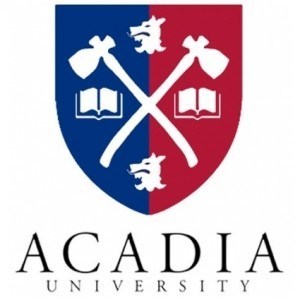Photos of university / #acadiau
The Bachelor of Applied Science (Engineering) program at Acadia University is a comprehensive undergraduate degree designed to prepare students for successful careers in various engineering fields. This rigorous program combines theoretical knowledge with practical skills, emphasizing critical thinking, problem-solving, and innovative design. Students will engage in a challenging curriculum that covers fundamental engineering principles, including mathematics, physics, and computer science, alongside specialized coursework in areas such as mechanical, electrical, civil, and software engineering. The program is structured to foster an interdisciplinary approach, encouraging collaboration across engineering disciplines and real-world applications. Throughout their studies, students have the opportunity to participate in internships, co-op placements, and hands-on projects that enhance their technical expertise and professional development. Acadia University's state-of-the-art laboratories and facilities provide an ideal environment for experiential learning, allowing students to work on cutting-edge technology and research initiatives. The program also emphasizes ethical considerations and sustainable engineering practices, preparing graduates to contribute positively to society and the environment. Graduates of the Bachelor of Applied Science (Engineering) program at Acadia University are well-equipped to pursue advanced education, professional engineering licensure, or direct entry into the workforce in industries such as aerospace, automotive, energy, construction, and information technology. With a strong foundation in engineering fundamentals and practical experience, students will be prepared to address complex engineering challenges and lead innovation in their chosen careers. The program’s supportive academic community and dedicated faculty members foster a collaborative learning environment, ensuring students receive personalized guidance and mentorship throughout their academic journey. By integrating theory with practice and emphasizing ethical responsibility, Acadia's Engineering program aims to develop competent, creative, and socially responsible engineers ready to make a meaningful impact in their fields.
The Bachelor of Applied Science (Engineering) program at Acadia University is designed to provide students with a comprehensive education in engineering principles, practical skills, and innovative problem-solving techniques. This rigorous program combines theoretical coursework with hands-on laboratory experience, preparing graduates to excel in diverse engineering fields such as mechanical, electrical, civil, and environmental engineering. Throughout the program, students engage with foundational topics including mathematics, physics, computer science, and materials science, which are essential for understanding complex engineering systems. Emphasis is placed on developing strong analytical skills, technical proficiency, and the ability to design, analyze, and improve engineering solutions.
The curriculum integrates modern engineering concepts with real-world applications, encouraging students to work on projects that address current technological challenges. In addition to core technical courses, students have opportunities to participate in co-operative education placements, internships, and research projects, allowing them to gain valuable industry experience and build professional networks. The program promotes teamwork, communication, and leadership skills, which are critical for successful engineering careers.
Students also have access to state-of-the-art laboratories and facilities that support experiential learning and innovation. The faculty members are experienced professionals and researchers dedicated to mentoring students and fostering an environment of academic excellence and creativity. Graduates of this program are well-equipped to pursue careers in engineering design, systems analysis, project management, or to continue their education through graduate studies.
Moreover, the Applied Science (Engineering) program at Acadia University emphasizes ethical responsibility and sustainable practices, preparing students to contribute positively to society and the environment. The multidisciplinary approach ensures graduates are adaptable and prepared to meet the evolving needs of the engineering industry. With a strong foundation in both theoretical knowledge and practical application, students are empowered to become leaders and innovators in their respective fields.
The Bachelor of Applied Science (Engineering) program at Acadia University is designed to provide students with a comprehensive foundation in engineering principles and applied sciences. Admission requirements typically include a high school diploma with strong academic performance in mathematics, physics, and chemistry. Prospective students must submit official transcripts, demonstrating their proficiency in relevant subjects, and may need to provide standardized testing scores such as the SAT or ACT, if required. Additionally, applicants may be asked to submit a letter of intent or personal statement outlining their interest in engineering and career goals. Some programs might require letters of recommendation from teachers or professionals who can attest to the applicant's suitability for an engineering curriculum.
Prerequisites often include coursework in calculus, algebra, and sciences obtained during secondary education, ensuring students are prepared for rigorous university-level instruction. International students must meet additional language proficiency requirements, such as a minimum score on TOEFL or IELTS tests, to demonstrate their ability to succeed in an English-speaking academic environment. Once admitted, students are expected to complete a series of core courses in mathematics, physics, and engineering fundamentals during the first two years of study. As they progress, students undertake specialized courses in areas such as mechanical, electrical, or civil engineering, depending on their chosen concentration. An emphasis on practical components, including laboratory work, project-based assignments, and cooperative education opportunities, is integral to the program.
Furthermore, students are encouraged to participate in internships and partnerships with industry to gain hands-on experience and enhance their professional skills. The program also typically includes a capstone project in the final year, requiring students to apply their accumulated knowledge to solve real-world engineering problems. Graduation from the program generally mandates the completion of a set number of credits, successful defense or presentation of the capstone project, and adherence to university academic standards. Overall, the Applied Science (Engineering) curriculum aims to equip graduates with the technical expertise, problem-solving skills, and ethical understanding necessary for a successful career in engineering fields.
The Applied Science (Engineering) program at Acadia University offers various financing options to support students throughout their academic journey. Tuition fees for the program are structured according to the undergraduate fee schedule, with international students paying higher rates than domestic students. In addition to tuition, students should budget for ancillary costs including textbooks, supplies, and laboratory fees, which vary depending on the specific courses and year of study. Acadia University provides numerous financial aid opportunities to help offset these costs, including entrance scholarships, awards based on academic achievement, and Bursaries for students demonstrating financial need.
Students are encouraged to apply early for scholarships, as many are awarded on a competitive basis. The university also participates in provincial and federal financial aid programs, which can provide loans and grants to eligible students. Acadia University’s Financial Aid Office offers guidance on application procedures and eligibility criteria for these programs. Furthermore, the university supports work-study opportunities, allowing students to gain work experience on campus while earning money to assist with educational expenses.
Private scholarships and external funding sources are also accessible, and students are advised to research options through community organizations, industry sponsorships, and scholarship databases. The university provides workshops and resources to assist students with budgeting and financial planning. For international students, additional funding options may include governmental scholarships or sponsorship programs from their home countries. The university's commitment to affordability and support services ensures that students pursuing their engineering studies can access the necessary financial resources to complete their degrees successfully. Overall, the financing landscape for the Applied Science (Engineering) program is designed to be comprehensive, offering multiple avenues for financial support tailored to diverse student needs.
The Bachelor of Science in Applied Science (Engineering) at Acadia University is designed to provide students with a comprehensive education in various engineering disciplines, combining theoretical knowledge with practical skills. The program emphasizes hands-on learning experiences, including laboratories, design projects, and internships, to prepare graduates for careers in engineering fields such as civil, mechanical, electrical, and environmental engineering. Students in this program gain a solid foundation in mathematics, physics, and computer science, which are essential for understanding and solving real-world engineering problems. The curriculum also integrates courses in ethics, sustainability, and project management, reflecting the evolving demands of the engineering profession. Acadia University's engineering program is accredited and holds recognition from relevant accreditation bodies, ensuring that graduates meet national and international standards. The program supports student engagement through research opportunities, student chapters of professional engineering societies, and industry partnerships, fostering professional development and networking. The university's small class sizes and dedicated faculty provide a supportive learning environment, encouraging active participation and individual mentorship. Graduates of the Applied Science (Engineering) program are well-equipped to pursue careers in consulting, manufacturing, government, or to continue their education in master's or doctoral programs. The program's emphasis on interdisciplinary learning prepares students to adapt to changing technological landscapes and to contribute positively to society through innovative engineering solutions.




